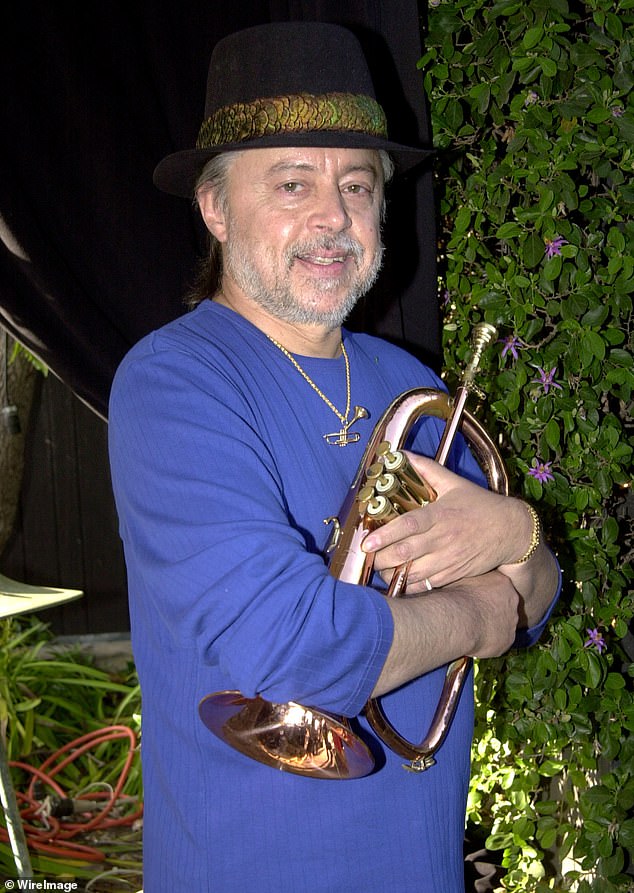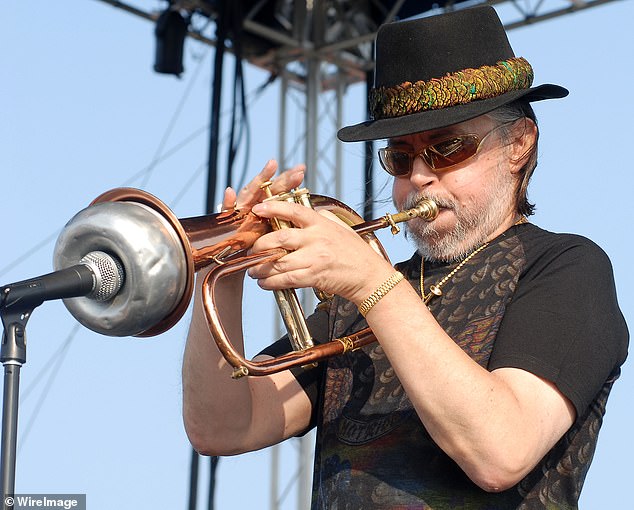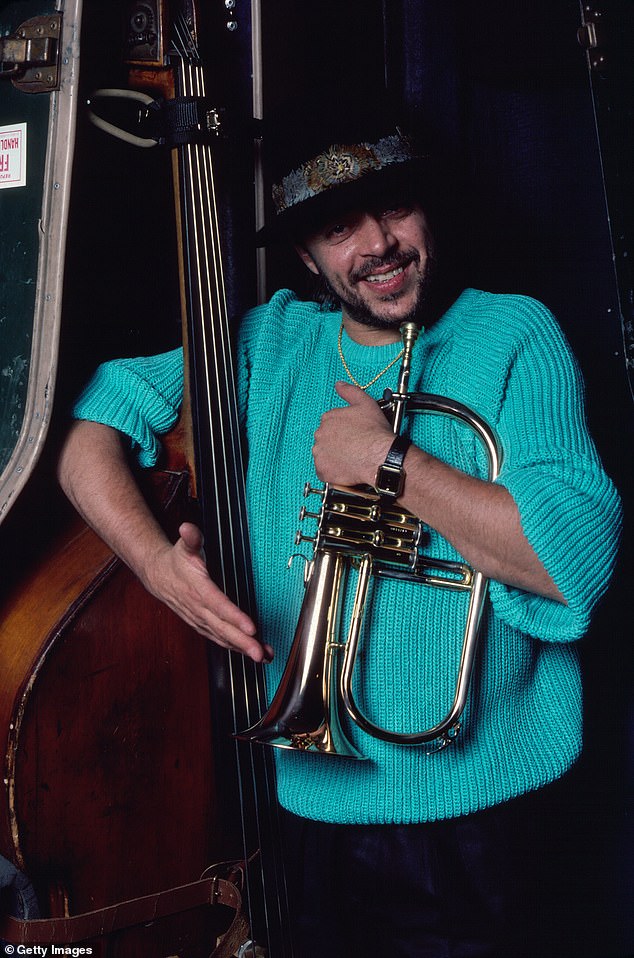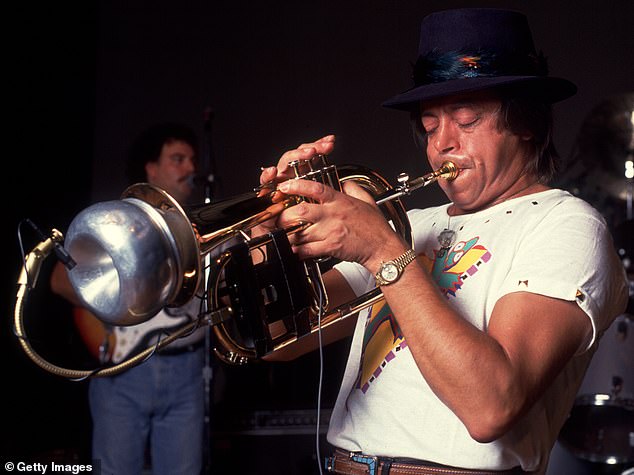Legendary jazz musician Chuck Mangione, the man behind the international hit single Feels So Good, has died at the age of 84.
The trumpet and flugelhorn player landed his career breakthrough in the 1960s performing for bandleader Art Blakely, before becoming a star in his own right.
He won two Grammy Awards over the course of his decades-long career, and his music was included in two Olympic ceremonies.
Mangione’s 1977 album Feels So Good, which contained the full nine-minute version of the instrumental title track, rocketed to number two on the Billboard 200.
When a truncated three-minute single of Feels So Good was released the following year, it too became a thunderous smash success.
He died this week of natural causes at home in his upstate New York hometown of Rochester, his manager informed TMZ.
Legendary jazz musician Chuck Mangione, the man behind the international hit single Feels So Good, has died at the age of 84; pictured in 1988

He died this week of natural causes at home in his upstate New York hometown of Rochester, his manager informed TMZ; pictured in 2004 at the Playboy Mansion
Charles Frank Mangione was born in 1940 in Rochester and fell in love with jazz thanks to his father Frank, a grocer who was an avid fan of the genre.
Mangione’s father ‘would take my brother Gap and me to Sunday-afternoon matinees at the jazz clubs,’ he fondly recalled. ‘When I was a kid, there were hordes of wonderful small group – Miles Davis’ band, Cannonball Adderley’s band, Sonny Rollins’ band, Sarah Vaughan, Carmen McRae, Charlie Ventura.’
The musical stars who came to town often wound up at the Mangione home for dinner at the invitation of young Chuck’s father.
‘At that time, there were two TV stations and two movies in town. The musicians were in town for two weeks, so when they found out that they could come over to our place and hear a good record collection, have some homemade pasta and some good Italian red, it wasn’t too hard to get them to come by,’ said Mangione.
‘It happened so often, so regularly, that it took me years to realize how significant it was. And I kind of grew up thinking that every kid had Carmen McRae or Art Blakey at his house,’ he confessed to the Los Angeles Times.
Mangione’s own early career in the 1960s included working with his pianist brother Gap, as well as a trumpeter in Art Blakely’s group the Jazz Messengers.
However his true stardom arrived in the 1970s, the decade he began collaborating with saxophonist Gerry Niewood as part of a quartet.
‘For a long time I lived in the shell of the so–called jazz musician, who said: “To hell with the people. I’m the artist, I know what’s right, and I’m going to play for myself. If they like it, fine; if they don’t, too bad,”‘ Mangione remarked in 1972.
‘Well, that’s partially true, but you can still maintain your musical conviction and try to communicate with people. For me, lifting the people up, making them enjoy what we’re doing is as important as it is for me to play the kind of music I want to play. Both are very possible.’

Charles Frank Mangione was born in 1940 in Rochester and fell in love with jazz thanks to his father, who was an avid fan of the genre; pictured in 2007

Mangione’s father ‘would take my brother Gap and me to Sunday-afternoon matinees at the jazz clubs,’ he fondly recalled; Chuck Mangione pictured 1986
During that decade he won his two Grammys, first in 1977 for his instrumental composition Bellavia and then for playing on the soundtrack for the 1978 Anthony Quinn movie The Children of Sanchez, for which Mangione also wrote the score.
The 1976 Summer Olympics in Montreal included Mangione’s composition Chase the Clouds Away – and four years later, the theme song for the Winter Olympics in Lake Placid, New York was another Mangione original called Give It All You Got.
Mangione’s beloved father Frank ‘Papa’ Mangione, who used to joke that he ‘played the cash register,’ retired from the grocery store business in 1975 and went on tour with his jazz musician sons, hawking their merchandise on the road.
Over a career in which he released 30 albums and earned 14 Grammy nods, Chuck Mangione’s crowning success was the album Feels So Good and its title single.
After the full LP emerged as a galloping success in 1977, Mangione was faced with the task of trimming its more than nine-minute title track to the length of a single.
‘We did major surgery on Feels So Good and cut it down to three minutes,’ the musical artist explained in the 1990s.
‘Then, without my knowing it, the engineer thought it might be a hair too slow and cranked it up a half a step in pitch. I didn’t find out until I went on a radio show and the deejay asked me to play along with it. I said: “Sure,” and then I discovered it was a half-tone higher. I said: “What? I’m half a step flat.” But it worked.’
In an era dominated by disco and rock ‘n’ roll, Mangione’s instrumental jazz single soared to number four on the Billboard Hot 100, a crossover triumph that he himself readily described as a ‘fluke.’
The track passed into musical history, included on the soundtracks of projects ranging from The Big Bang Theory and Doctor Strange.
Mangione also earned a firm position as a pop culture icon of sorts, to the point he memorably played himself on the beloved animated series King of the Hill.
With his trademark top hat and his trumpet regularly in hand, Mangione was unmistakable even in cartoon format.

